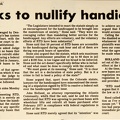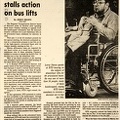Rocky Mountain News 9/5/81 Denver, CO
Handicapped buoyed by judge's ruling
By JANE HULSE, News Staff
A Denver judge Friday dismissed charges against 20 able-bodied protesters who invaded the Denver mayor's office last spring because 23 other protesters in wheelchairs had not been ticketed.
That, said County Judge Edward A. Simons, is reverse discrimination.
The unusual ruling by Simons was hailed by the handicapped community as a "significant” victory.
The ruling stemmed from a protest May 15 in the office of Mayor William H. McNichols Jr. concerning budget cuts that would affect handicapped residents.
The demonstrators were ordered to leave the building at 5 p.m. after McNichols refused to meet with the group about the cuts in the city’s health-care systems budgets.
When the group refused to leave, those in wheelchairs were not ticketed, but the able-bodied protesters were charged with interference —- a misdemeanor carrying a maximum penalty of 90 days in jail or a $300 fine. None was taken to jail and booked.
The attorney for the protesters, John Holland, argued that his clients were entitled to equal protection under the law and that the law shouldn’t be enforced selectively against one group.
“It takes a message to the mayor that he can’t insult the disabled community by ignoring them," said Wade Blank, a spokesman for the disabled. “The disabled are telling me that next time (they meet with McNichols) he will have to treat them differently.”
He said the ruling will cause the handicapped people to become even more outspoken
and demonstrative about fighting for their rights. Knowing they would be subjected to jail at demonstrations doesn't frighten them, he said, noting that the jail has wheelchair access.
Blank said the city’s decision to ticket only those demonstrators who were not in wheelchairs had the effect of making the handicapped feel as if they weren't being recognized as people.
“It made them feel like second-class citizens he said. He said the handicapped demonstrators knew they were breaking the law by refusing to leave and “they were willing to pay the price.”
According to the ruling, the city decided not to ticket the handicapped for fear that some weren't able to remove themselves from the office or didn’t understand the orders to leave.
But Simons noted that “the time and resources were available to make those determinations."
The judge also stated, “The fact that none of the disabled persons were charged in spite of their active resistance to leaving renders the city's evidence insufficient to overcome the inescapable conclusion that the defendants have been denied equal protection of the laws.”
- Created on
- Wednesday 10 July 2013
- Posted on
- Tuesday 10 May 2016
- Tags
- able bodied, court, Denver, John Holland, Mayor McNichols, protesters, reverse discrimination, second class citizens, Wade Blank, wheelchairs
- Albums
- Visits
- 2570
- Rating score
- no rate
- Rate this photo


0 comments